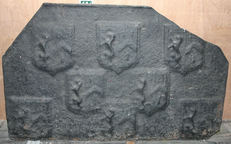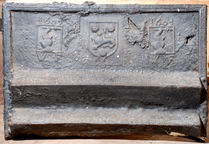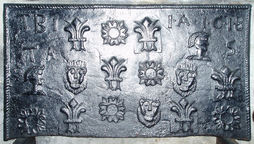-
949
Description: Rectangular; low-relief moulded edging along top, then down sides; double-looped 'lens' pattern stamp repeated six times across the top, inside the edging and, rotated, three times down each side; becapped human figure stamp, with his left arm raised to his head and his right arm akimbo, repeated in each top corner; between these, 'IE' monogram with continuous loop between the letters repeated five times, two in line above and three below, the centre one slightly raised; the date between the top two; a lifting handle on each side.
Notes: Said to have been at Horsham, Sussex; on another fireback, at the Old Manor, Upper Beeding in Sussex, cast with the same stamps, and also dated 1617, the monogram stamp is clearly carved on a 'renaissance' shield, indicating that in this instance the stamps were not impressed as deeply. Drawing by J. Lewis André in the J. Starkie Gardner Collection, Victoria & Albert Museum, Archive of Art and Design (AAD/2014/8). Possibly the fireback referred to by Lewis André in 1882 as belonging to a Miss Alman, of East Street, Horsham (Sussex Archaeological Collections XXXII, p.76).
Inscription: IE 1617 IE / IE IE IE
- Decoration tags:
- rectangular (shape)
- complex individual (edging)
- carved stamps
- individual numbers
- lifting handles
- monogram
- text
- humans
Manufactured: in 1617 in the Weald area of England.
Current location: not known.
Citation: Gardner, J. S., 1898, 'Iron Casting in the Weald', Archaeologia, 56, 1, pp. 133-164.
Citation: Gardner, J. S., 30 Apr 1904, 'An old fire-back' (letter), Country Life, p. 647.
-
1284
Description: Arched rectangular shape; gadrooned edging (top and sides); initials, in separate stamps, at top of arch; date probably in separate stamps, below; spindle used as a stamp repeated three times, one between date and initial stamps, the other two below to left and right.
Notes: The same base board and spindle have been used for other firebacks of the same period. A similar casting (no. 299) has the 'W' in a slightly different position. Formerly at Warnham Court, Sussex.
Inscription: I W / 16 22
- Decoration tags:
- rectangular with round arch (shape)
- gadrooned (edging)
- simple stamps
- individual letters
- individual numbers
- text
- objects
Manufactured: in 1622 possibly at Cuckfield Furnace in the Weald area of England.
Current location: not known.
Citation: Gardner, J. S., 1898, 'Iron Casting in the Weald', Archaeologia, 56, 1, pp. 133-164.
- Attached to series:
- Spindle series
- Spindle/distaff firebacks
-
1062
Description: Rectangular with ogee arch; ovolo, egg and dart edging; shield, garter, helm, mantling, crest and motto of the English House of Stuart; date split either side of garter buckle.
Notes: One of several firebacks, all of the same date, but varying in size, framing style and moulding; all have stylistic features in common and will have been the work of the same pattern maker, who was also responsible for carving royal coats of arms in three West Country churches. Similar in design but proportionately different to no. 880.
Copies of this fireback are known.
Inscription: HONI SOIT QVI MAL Y PENSE / 16 18
Arms: English Stuart royal (James I)
- Decoration tags:
- rectangular with ogee-arch (shape)
- ovolo, egg and dart (edging)
- whole carved pattern
- heraldic
- armorial
- text
Manufactured: in 1618 possibly in the Forest of Dean area of England.
Current location: not known.
-
70
Description: Arched rectangular shape; simulated twisted rope edging (top & sides); symmetrical arrangement of fleurs de lys (two types - 2 and 1), diamond shapes (2) and cross-cut squares (4) includes the monogram in which the letters I and F are separated by a small, hollow diamond stamp, the M being above; interspersed symmetrical arrangement of raised spots (8).
Notes: The initials, as with other triple-lettered forms, in which the middle letter is set apart from the other two, may relate to a married couple where their surname initial is M. Another example seen has shown that the pattern was formed of five angular, uneven-sized planks battened together.
Copies of this fireback are known.
Inscription: 1613 / M / I F
- Decoration tags:
- rectangular with round arch (shape)
- simulated rope (edging)
- simple stamps
- carved stamps
- individual letters
- individual numbers
- planklines
- heraldic
- text
Manufactured: in 1613 in the Weald area of England.
Current location: Godalming Museum, Godalming, Surrey, England.
Museum number: B980.400 (part of the Godalming Museum museum group)
- Attached to series:
- Diamond series
-
74
Description: Rectangle with flattened ogee arch; ovolo, simulated rope edging; shield, garter, helm, mantling, crown and supporters (crowned lion and unicorn) of the English royal house of Stuart; motto across base
Notes: A variation of a type, dated 1618, noted at Burwash, Sussex.
Copies of this fireback are known.
Inscription: DIEU ET MON DROIT
Arms: English Stuart royal
- Decoration tags:
- rectangular with ogee-arch (shape)
- simulated rope (edging)
- whole carved pattern
- armorial
- text
Manufactured: in the early-17th century possibly in the Weald area of England.
Current location: in private hands, Groombridge, Kent, England.
- Attached to series:
- Stuart royal armorial firebacks
- Bristol armorial group
-
882
Description: Arched rectangular shape; simulated twisted rope edging (top & sides); symmetrical triad arrangement of fleurs de lys (two types - 2 and 1), diamond shapes (2) and cross-cut squares (4) includes the monogram in which the letters I and F are separated by a small, hollow diamond stamp, the M being above between I and reversed B; interspersed symmetrical arrangement of raised spots (8).
Notes: The initials, IMF, as with other triple-lettered forms, in which the middle letter is set apart from the other two, may relate to a married couple where their surname initial is M; a variant of the more common version but with additional letters I and B separately stamped. Life-size pencil drawing (anon.) in Historic England Record Centre, Swindon, Wiltshire (MD96/06202) of a fireback originally at 124 Heath Street (formerly the Upper Flask Tavern), Hampstead, London.
Inscription: 1613 / I M B / I F
- Decoration tags:
- rectangular with round arch (shape)
- simulated rope (edging)
- carved stamps
- carved pattern panels
- individual letters
- individual numbers
- heraldic
- text
Manufactured: in 1613 in the Weald area of England.
Current location: not known.
Museum number: MD96/06202 (part of the Historic England museum group)
- Attached to series:
- Diamond series
-
103
Description: Rectangular; flanged or astragal and fillett edging; female portrait in a medallion of three concentric rings; date split between four corners
Notes: An unusually small stoveplate.
Inscription: 1 6 [?0] 4
- Decoration tags:
- rectangular (shape)
- astragal & fillet (edging)
- whole carved pattern
- individual numbers
- pictorial
- text
- humans
Manufactured: in 1604 possibly in the Eifel area of Germany.
Current location: Haslemere Educational Museum, Haslemere, Surrey, England.
(part of the Haslemere Educational Museum museum group)
- Attached to series:
- Stoveplates
-
151
Description: Canted rectangle; ovolo moulded edging (top and sides); eight shields of Ayloffe impaling Sulyard in three rows 3-2-3. Top right corner missing
Notes: Ayloffe: sable, a lion rampant Or, collared gules, between three crosses formy of the second; Sulyard: argent, a chevron gules between three pheons inverted sable. William Ayloffe (c1535-1584) of Bretons, Hornchurch, Essex, Justice of the Court of Queen’s Bench, married (c1560) Jane, dau. of Sir Eustace Sulyard, of Runwell, Essex. There is a large number of variants using the same shields. Formerly part of the Ade Collection (from Grove Hill, Hellingly, Sussex).
Arms: Ayloffe impaling Sulyard (William Ayloffe of Bretons, Hornchurch)
- Decoration tags:
- rectangular with canted top corners (shape)
- ovolo (edging)
- carved stamps
- armorial
Manufactured: in the early-17th century in the Weald area of England.
Current location: Hastings Museum and Art Gallery, John's Place, Bohemia Road, Hastings, East Sussex, England.
Museum number: HASMG: 1952.51.43 (part of the Hastings Museum museum group)
- Attached to series:
- Ayloffe series
- Personal armorial firebacks
-
179
Description: Rectangular; double fillet moulded edging; top centre, on a rectangular block, shield of the arms of the Fowle family - (Gules) a lion passant guardant between three roses (Or); on each side, two rectangles, each containing a helm and the crest of the Fowles - an Arm in armour holding a Battle axe issuant from a Ducal Coronet, above each being the date, 1603, and below each the initials, WF. Across the lower half of the fireback are two solid triangular prisms of iron.
Notes: The stamps relate to William Fowle (1568-1634), ironmaster of Riverhall furnace. The shield stamp also appears on grave slabs in Wadhurst and Frant churches and on an unprovenanced graveslab in Maidstone Museum. The iron prisms were included, perhaps, to retain heat and to prevent the fireback from cracking. Formerly part of the Ade Collection (from Grove Hill, Hellingly, Sussex).
Inscription: 1603 WF [twice]
Arms: William Fowle, of Frant and Wadhurst
- Decoration tags:
- rectangular (shape)
- double fillet (edging)
- carved stamps
- heraldic
- armorial
- text
Manufactured: in 1603 probably at Riverhall Furnace, Wadhurst in the Weald area of England.
Current location: Hastings Museum and Art Gallery, John's Place, Bohemia Road, Hastings, East Sussex, England.
Museum number: HASMG: 1952.51.59 (part of the Hastings Museum museum group)
- Attached to series:
- Fowle series
-
192
Description: Rectangular; twisted rope edging (top and sides); irregular arrangement of four stamps in three rows: face mask with ?crown and ruff (3), flower head with four petals and leaflets (4), fleur de lys (5), and profile of a head with 'Roman' crest (2); initials replace stamps in top corners.
Notes: A larger variant, undated and with other initials but the same four stamps, is also known.
Inscription: TBI I•A•1•6•1•8 / TA S
- Decoration tags:
- rectangular (shape)
- rope (edging)
- carved stamps
- individual letters
- individual numbers
- heraldic
- text
- humans
- plants
Manufactured: in 1618 possibly in the Weald area of England.
Current location: Godolphin House, Helston, Cornwall, England.
Museum number: 169481 (part of the National Trust museum group)
- Attached to series:
- Primitive stamp series
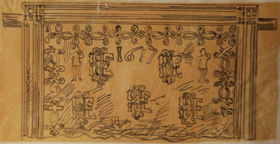
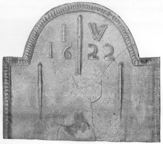
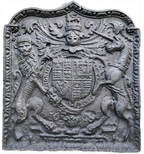
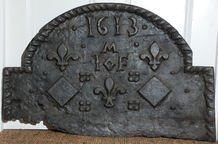
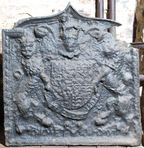
.jpg)

